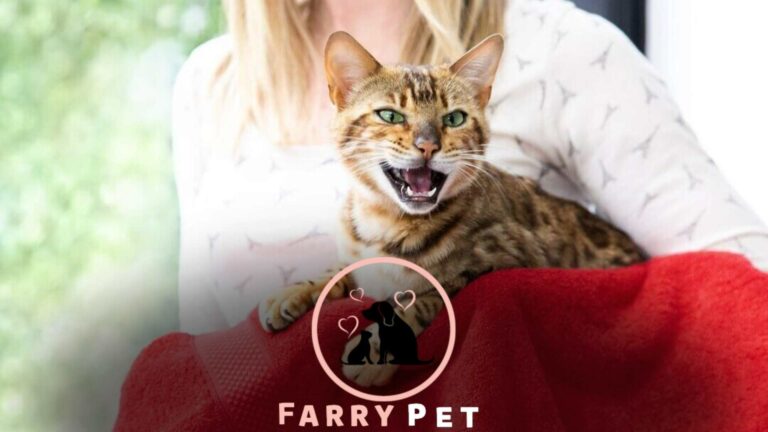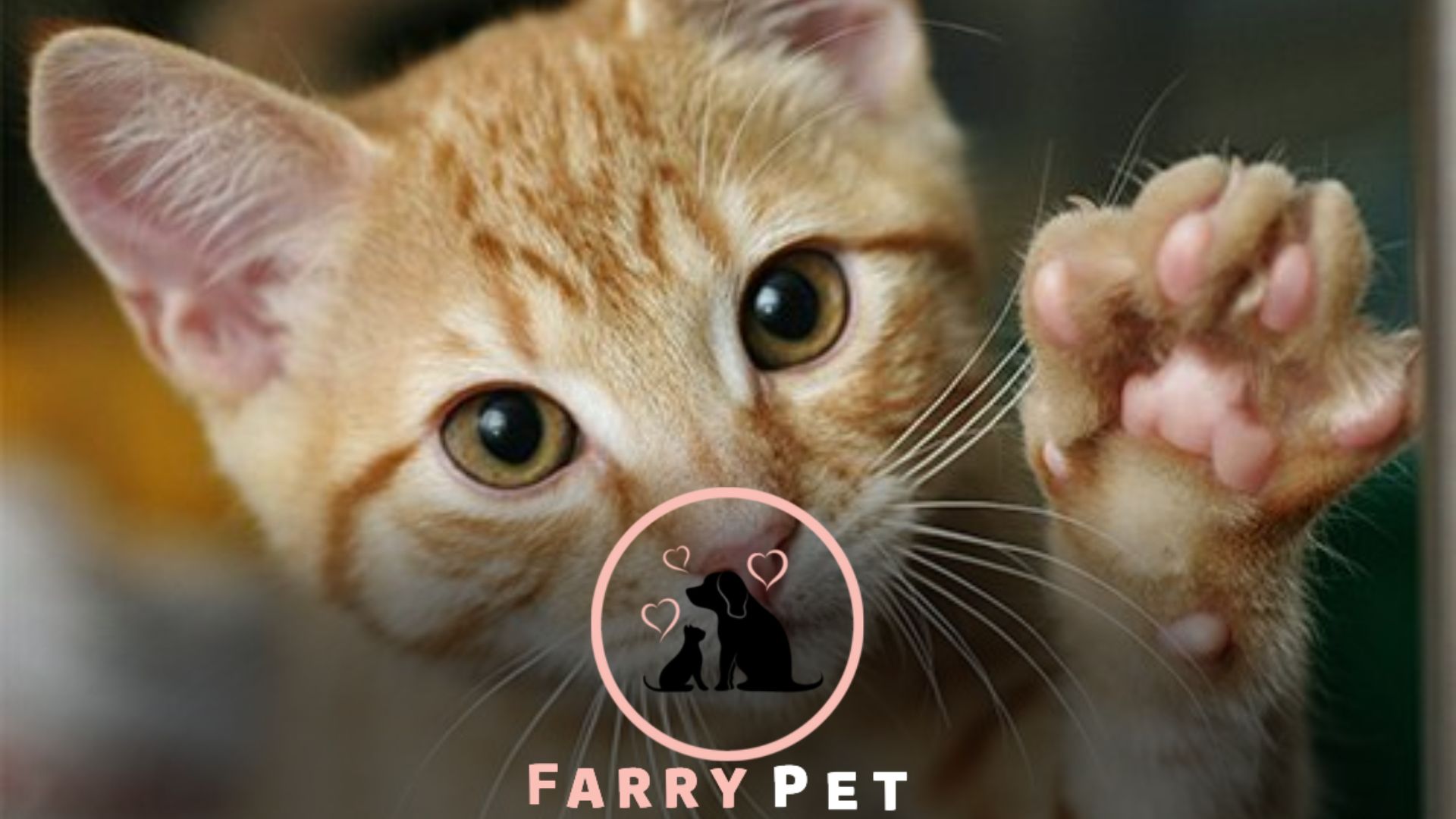
Uncover the real reasons behind; why my cat’s peeling paws in this informative article. Get insights into potential causes and how to provide relief for your feline friend’s discomfort.
A cat’s paws may peel due to various factors such as allergies, fungal infections, or excessive dryness. Peeling of the cat’s paws can result from allergies, fungal infections, or excessive dryness.
These conditions can cause the skin on the paw pads to become dry, crack, and peel. Allergies may be triggered by environmental factors, such as pollen or household chemicals, while fungal infections can occur due to unclean or damp living conditions.
Additionally, excessively dry air or lack of moisture in the cat’s living environment can lead to peeling paws. It is essential to consult a veterinarian for an accurate diagnosis and appropriate treatment for your cat’s paw peeling issue.
Why Are My Cat’s Paws Peeling?
Dry Environment
Dry environment can cause your cat’s paws to peel. Lack of moisture in the environment is often the culprit.
Humidity plays a crucial role in maintaining the health of your cat’s paws. When the air is dry, it can lead to dry and cracked paws.
This condition can be uncomfortable for your cat and may even cause pain. To prevent peeling paws, you should consider increasing the humidity in your home.
Using a humidifier or placing water bowls strategically around the house can help. Providing your cat with moisturizing paw balms or creams can also provide relief and promote healing.
Maintaining an optimal humidity level ensures that your cat’s paws stay healthy and free from peeling. While addressing issues like why your cat’s paws might be peeling, it’s also crucial to understand other feline behaviors, such as ‘why do cats’s noses get wet when they purr?’ – all of which contribute to their overall well-being.
Allergic Reactions
Allergies in cats can manifest in various ways, and paw peeling is one potential indicator. Cats can develop allergic reactions to common allergens, such as pollen, dust mites, certain foods, or even certain cleaning products.
Symptoms of allergies in cats can range from itching and sneezing to skin irritations and gastrointestinal issues.
In some cases, cats may excessively lick or bite their paws, leading to skin peeling. Monitoring your cat’s behavior and seeking veterinary advice if paw peeling is observed is important.
Identifying and addressing the underlying cause of the allergy can help alleviate discomfort and prevent further complications.
Proper diagnosis and treatment are crucial in managing allergic reactions in cats and ensuring their overall well-being.
Parasitic Infections
Parasitic infections can be a common cause of peeling paws in cats. Various parasites, such as fleas, ticks, and mites can cause these infections. These parasites can irritate the skin on your cat’s paws, leading to excessive scratching and peeling.
To prevent such infections, it is important to regularly check your cat for any signs of parasites and take appropriate preventive measures, such as using flea and tick medications.
If your cat already has a parasitic infection, treatment options include medicated shampoos, topical ointments, or oral medications prescribed by a veterinarian.
Remember, early detection and timely treatment are crucial in ensuring the well-being of your furry friend and keeping their paws healthy and moisturized.
Discovering the reasons behind peeling cat paws can lead to a better understanding of your furry companion. Additionally, you might be curious about what to do when your cat is foaming at the mouth, topics that are essential for every cat owner to explore.
Nutritional Deficiencies
Nutritional deficiencies can contribute to peeling and dryness in a cat’s paws. Essential nutrients are necessary for healthy paws. Deficiencies in these nutrients can cause the skin on the paws to become dry, cracked, and peeled.
To promote paw health, it is important to balance a cat’s diet and ensure they are receiving all the necessary nutrients.
Providing a well-rounded and complete diet can help prevent paw problems and keep them in optimal condition. By ensuring that your cat is getting the right nutrients, you can help maintain the health and appearance of their paws.
So, pay attention to their nutrition and keep those paws in great shape!
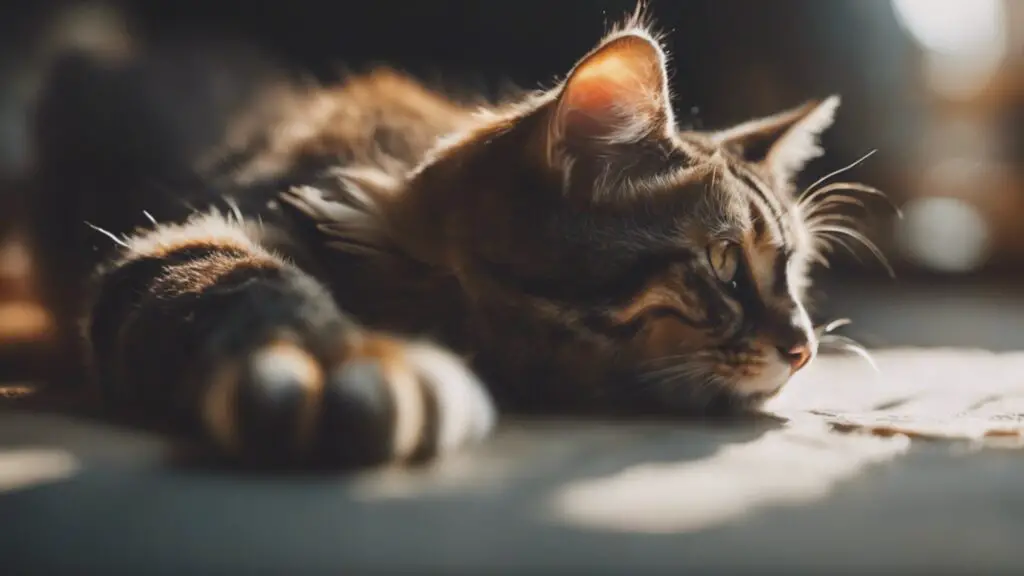
Inflammatory Conditions
Feline autoimmune diseases can lead to inflammation in a cat’s paws, causing them to peel. The condition can be diagnosed through a thorough examination by a veterinarian, including blood tests and tissue biopsies.
Management of paw inflammation typically involves treatment with anti-inflammatory medications, such as corticosteroids or non-steroidal drugs.
In addition, your vet may recommend topical treatments or changes in your cat’s diet to help alleviate the symptoms and prevent further inflammation.
It’s important to address paw peeling promptly, as chronic inflammation can lead to pain, discomfort, and potential secondary infections.
If you notice any signs of paw peeling or inflammation, seek veterinary care to appropriately diagnose and manage the condition for your cat’s well-being.
Trauma or Injury
Cats’ paws can peel due to trauma or injury, which may result from various common causes. Accidents, falls, or getting caught in objects can lead to paw injuries.
These injuries can cause the outer layer of the paw pad to peel, exposing the sensitive skin underneath.
If your cat has injured its paws, it is important to provide first aid and seek veterinary care. If necessary, clean the affected area with a mild antiseptic solution and apply a sterile bandage.
It is crucial to monitor the injury for signs of infection, such as redness, swelling, or discharge.
In severe cases, your veterinarian may prescribe antibiotics or recommend further treatment. Regularly checking your cat’s paws and promptly addressing any injuries can help prevent more serious complications and ensure their speedy recovery.
Environmental Irritants
Cat’s paws peeling could result from environmental irritants they come into contact with. Harmful substances present in their surroundings can affect the condition of their paws.
These irritants might cause dryness, cracking, or even peeling. Minimizing your cat’s exposure to these irritants is essential for their paw health.
Ensure your cat’s living environment is clean and free from potentially harmful chemicals or substances. Use pet-safe cleaning products and avoid exposing your cat to strong fumes or toxins.
Additionally, wiping your cat’s paws with a damp cloth after they’ve been outdoors can help remove any irritants they may have picked up.
Regular grooming and inspecting your cat’s paws for any signs of irritation can also play a crucial role in preventing peeling. Taking these precautions can help keep your cat’s paws healthy and free from peeling.
Overgrooming Behavior
Cats may exhibit overgrooming behavior for various reasons, leading to peeling paws. Excessive grooming can result from stress, anxiety, or even skin allergies.
When cats groom obsessively, they may inadvertently cause damage to their paws, causing the skin to peel.
Cats may also overgroom if they have parasites or skin infections. To manage overgrooming behaviors and alleviate paw issues, it is crucial to identify the underlying cause.
Reducing stressors in the cat’s environment, providing mental and physical stimulation, and ensuring a balanced diet can help alleviate excessive grooming.
Regular grooming sessions, using appropriate grooming tools, and keeping the cat’s living area clean and flea-free can also be beneficial.
Seeking veterinary advice and guidance is essential in determining the cause and finding the appropriate treatment for overgrooming issues in cats.
In addition to discovering solutions for peeling cat paws, it’s worth delving into the topic of feline behavior, such as what it means when a cat bites you hard.
Home Remedies and Treatments
Proper care and hygiene are essential for your cat’s paws to prevent peeling. Natural remedies like soothing paw balms and coconut oil can help moisturize and heal dry, cracked skin.
Regularly trimming your cat’s claws can also reduce irritation and damage to the paw pads.
If you notice persistent peeling or your cat shows discomfort, it’s important to seek veterinary assistance. A veterinarian can diagnose any underlying health issues and provide proper treatment.
Monitor for symptoms like redness, swelling, or bleeding, which may indicate a more serious problem.
Taking proactive measures to address your cat’s paw peeling will ensure their comfort and overall well-being.
Preventive Measures
Caring for your cat’s paws ensures their overall health and well-being. Regular veterinary check-ups and vaccinations help in preventing any potential issues.
To create a paw-friendly environment, consider providing soft bedding, avoiding harsh chemicals on floors, and keeping hazardous objects out of reach.
Additionally, ensure that your cat’s claws are trimmed regularly to prevent discomfort or injuries. Moisturizing their paws with a cat-friendly moisturizer can help keep them hydrated and prevent peeling.
By following these preventive measures, you can promote healthy and happy paws for your feline friend.
Conclusion: Why Are My Cat’s Paws Peeling!!
If you have noticed that your cat’s paws are peeling, it is essential to identify the underlying cause and take appropriate action. Peeling paws can be caused by various factors, such as allergies, infections, or even dry weather.
It is crucial to monitor your cat’s paw health and provide necessary care, including regular grooming and moisturizing.
Additionally, ensuring a clean and safe environment can help prevent any potential irritants or harmful substances from affecting your cat’s paws.
Regular visits to the veterinarian can also help identify any health issues early on and provide the necessary treatment.
Remember, understanding and addressing the cause of your cat’s peeling paws can help ensure their comfort and well-being. So, keep a close eye on your feline friend’s paws and seek professional advice if necessary.

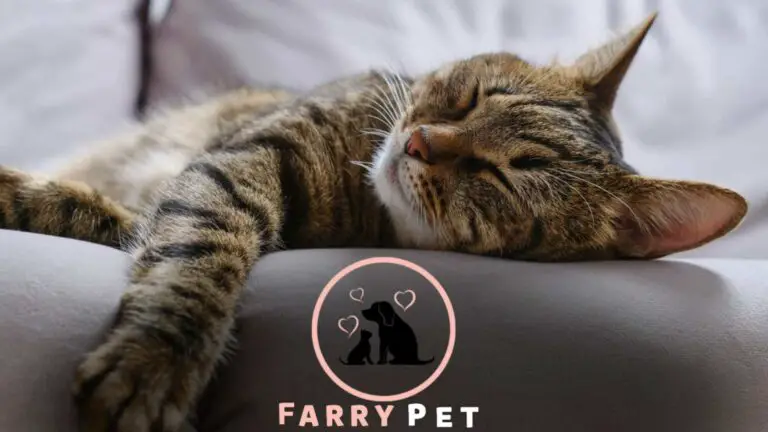
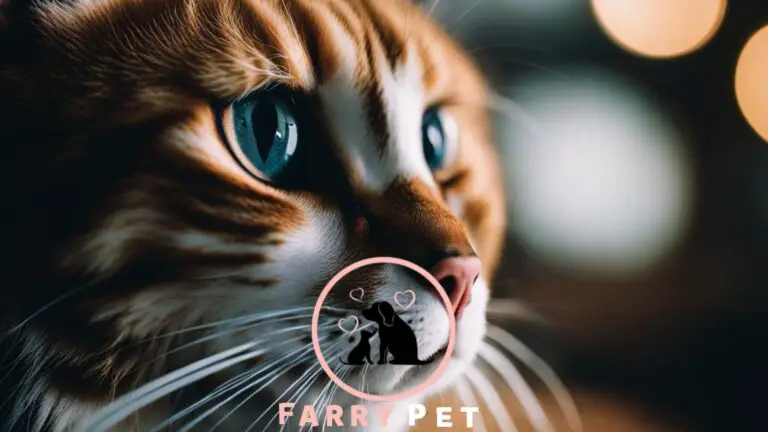
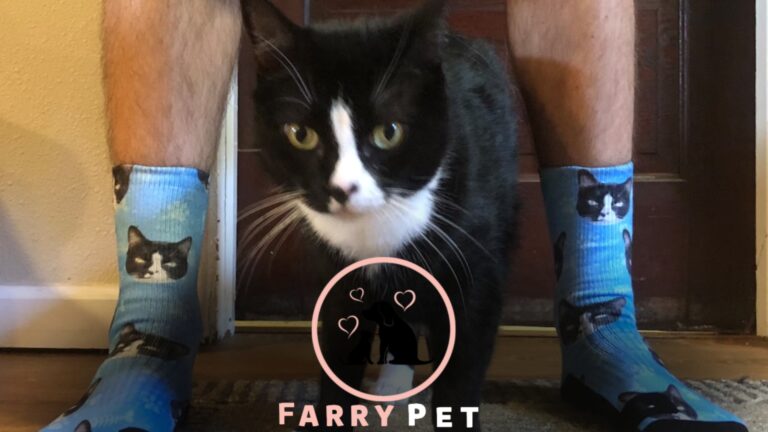

![Are Heated Blankets Safe for Cats? [Keep your Feline Friend Cozy and Secure]](https://farrypet.com/wp-content/uploads/2023/09/Are-Heated-Blankets-Safe-for-Cats-2-768x432.jpg)
